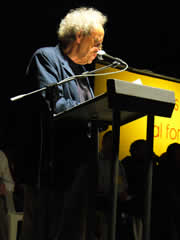Bernard Noël, France

Por:
Bernard Noël
Traductor:
Nicolás Suescún
PROMETEO
Latinoamerican Poetry Magazine
No 81-82. July 2008.
and now is still now even though everything slides
even though everything goes on leaving a trickle on the skin
one does not know why or on what this thing passes
the throat is tired of inhaling air to make a word
a nocturnal and somber thing tickles maybe it´s fatigue
the world must yet grow old and undo its limit
as the body finds by itself infinity in a dream
it does not know then that a dream has replaced life
and that everything grows silent to celebrate this replacement
however something moves in the back room of the head
it is a shadow that comes a shadow that goes
or it´s just the world at last reduced to its dense smoke
the wind looks for a soul believing it can find it under the door
issuing its gust into the blackness but it is there
in the passage where dust has picked up its footprints
and now one must raise one´s fist and hit the memory
like a tapestry that must brutally restitute the image

BERNARD NOËL was born in France in 1930- April 13, 2021. He was one of the most important poets and essayist of the world today.Hisbooks published include: Les yeux chimères, 1953; Extraits du corps, 1958; La face de silence, 1967; A vif enfin la nuit, 1968; Le Dictionnaire de la Commune, 1971; Treize cases du je, 1975; L’Outrage aux mots, 1975; Lecture du chilom, 1977; Une messe blanche, 1977; Le 19 octobre 1977, 1979; Le Château de Hors, 1979; D’une main obscure, 1980; Bruits de langues, 1980; L’été langue morte, 1982; La moitié du geste, 1982; Poèmes 1, 1983; La chute des temps, 1983; L’enfer, dit-on…, 1983; Fables pour ne pas, 1985; La rencontre avec Tatarka, 1986; La rumeur de l’air, 1986; Journal du regard, 1988; Onze romans d'oeil, 1988; Portrait du monde, 1988; La Reconstitution, 1988; Les premiers mots, 1990; Le Château de Cène, 1992; La Chute des temps, 1993; L'Ombre du double, 1993; Le Syndrome de Gramsci, 1994; La Castration mentale, 1994; La Maladie de la chair, 1995; L’Espace du désir, 1995; Le Reste du voyage, 1997; Le tu et le silence, 1998; Treize cases du je, 1998; Magritte, 1998; La Langue d'Anna, 1998; La Maladie du sens, 2001, Le roman d’Adam et Eve, 2001; La Face de silence, 2002; Romans d'un regard, 2003; Le Retour de Sade, 2004; Les Yeux dans la couleur, 2004; Un trajet en hiver, 2004; Le Sillon des sens, 2005; La Vie en désordre, 2005. When Le Château de Cène (translated as The Castle of Communion) first appeared in France in 1969, under the sonorous pseudonym of Urbain d’Orlhac, it created a sensation. Immediately recognised as being among the finest works of French literary eroticism (along with, say, Bataille’s Story of the Eye, or Reage’s Story of O), its author was soon identified: the poet and essayist Bernard Noël. The author recounts an intense initiatory sexual quest which occurs on a mysterious remote island. Chosen as the moon’s lover the hero undertakes a Dantesque voyage through sucessive levels of pain and ecstasy. The book’s climax is a beatific rite of sexual purification in the Castle of Communion, which is described in a poetic language at once incantatory, crude and almost mystical. The intensity of the book matches its method of composition: dictated into a tape recorder and finished in only 3 weeks, and written as a partial response to the atrocities of the French authorities in Algeria. This edition is postfaced by Noël’s essay The Outrage Against Words, his thoughts on the government’s unsuccessful attempts through the courts to supress the novel for “outraging public morals.” He illuminates the intimate connection between writing and censorship in general.
